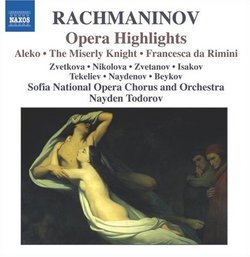| All Artists: Rachmaninoff, Mariana Zvetkova, Boiko Zvetanov, Nayden Todorov Title: Rachmaninov: Opera Highlights (HLTS) Members Wishing: 0 Total Copies: 0 Label: Naxos Original Release Date: 1/1/2006 Re-Release Date: 8/29/2006 Genre: Classical Style: Opera & Classical Vocal Number of Discs: 1 SwapaCD Credits: 1 UPC: 747313281725 |
Search - Rachmaninoff, Mariana Zvetkova, Boiko Zvetanov :: Rachmaninov: Opera Highlights (HLTS)
 | Rachmaninoff, Mariana Zvetkova, Boiko Zvetanov Rachmaninov: Opera Highlights (HLTS) Genre: Classical
|
Larger Image |
CD Details |
CD ReviewsAn Introduction to Rachmaninoff's Operas on a Budget Label J Scott Morrison | Middlebury VT, USA | 09/21/2006 (4 out of 5 stars) "Rachmaninoff is known to most people from his piano concertos, particularly the Second and Third. To some others he is known by his solo piano music, or his symphonic music, or his recordings as a superb pianist. But early in his career Rachmaninoff tried his hand a composing operas and on this disc we have music from the only three operas he ever completed -- Aleko (1893), The Miserly Knight (1904), and Francesca da Rimini (1906) -- all one-acters. They are performed here by Bulgarian artists and although we in the West tend to have trouble locating Bulgaria on our musical map, there is a long tradition there of fine productions of Russian opera and the cultivation of marvelous opera singers -- Boris Christoff, Nicolai Ghiaurov, Raina Kabaivanskaya, Vesselina Kasarova and Ljuba Welitsch come to mind -- and there have been excellent recordings of particularly Russian opera from the Sofia National Opera, the company represented on this disc.
Aleko, based on a Pushkin's 'The Gypsies', was Rachmaninoff's Moscow Conservatory graduation piece and there are some endearing student aspects to it, particularly the somewhat awkward fugue in 'The Entrance of the Gypsies.' But Rachmaninoff's ability to write great sweeping melodies with a melancholic undertone is already apparent. There is a good deal of orchestral music among the highlights recorded here and the 'Women's Dance' and 'Men's Dance' are particularly effective. Alexander Tekeliev, a black-voiced bass, makes an effective Aleko. Zemfira is sung by a soprano, Mariana Zvetkova, whose typical Slavic vocal edge may not be to everyone's taste, but she is dramatically and musically apt in her portrayal. The Old Gypsy, who sings about his wife leaving him, is movingly sung by basso Peter Naydenov. The Young Gypsy, tenor Boiko Zvetanov, has a voice with heft and squillo, but the voice is not always under complete control. The chorus has an important part in the action and the Sofia National Opera chorus is up to the challenge. The Miserly Knight is a claustrophobic melodrama, based on Pushkin's 'little tragedy' of the same name. It is essentially a three-character piece -- the Miserly Knight, sung by basso Plamen Bykov; his son Albert, sung by tenor Zvetanov, and the Duke, sung by baritone Niko Isakov. The plot is basically about a man who is so greedy and miserly that he gives no money to his spendthrift son who then complains to the Duke. We hear the final scene in which the Knight tells the Duke that his son wants to kill him for his money. The son bursts in, accuses his father of lying. The father challenges him to a duel, but the Duke intervenes, banishes the son and then turns angrily on the Knight who works himself up so much that he dies on the spot. Suitably dramatic music accompanies the action and is nicely done by the three principals. Francesca da Rimini is based on the same scene from Dante (about the illicit affair of Paolo and Francesca) that had earlier interested Tchaikovsky, and indeed the libretto is by Tchaikovsky's brother Modest. On this highlights disc we primarily hear music from Scene II where Paolo reads the story of Lancelot and Guinevere to Francesca, the passion between them builds and they fall into each others arms only to have her husband, Lanceotto, enter. He pulls out his dagger and kills them both. An epilog occurs in the Inferno with the two lovers lamenting that nothing is worse than recalling a time of happiness during a time of misery. The singers are the same as above and seems actually to sound better than in the earlier operas with Zvetanov and Zvetkova joining their voices in ardent soaring lines during the romantic scene in the garden. This is an opera that should be mounted from time to time. For those who want to dip their toes into the operatic music of Rachmaninoff, this CD would be a good bet. Libretto is not included in the booklet but there is a website offered which provides the full libretti in .pdf format. For those wanting recordings of the full operas, there is a set that includes all three -- with Neeme Järvi conducting and with Maria Guleghina, Sergei Larin, Sergei Leiferkus and Anne-Sofie von Otter in the casts -- and at mid-price. I have not heard it but it has gotten good reviews. Scott Morrison" |

 Track Listings (32) - Disc #1
Track Listings (32) - Disc #1